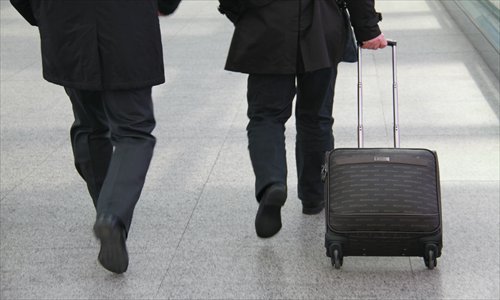HOME >> CHINA
Vanishing without a trace
By Zhang Yiwei Source:Global Times Published: 2013-8-18 21:38:01

Photo: CFP
On May 28, Cai Daoming, head of the animal husbandry and veterinary bureau in Gong'an county, Hubei Province, walked out of the office for his lunch break.
He never came back.
A month later, after failing to find any sign of him, the county decided to remove Cai from his position. Investigations into his whereabouts have failed to uncover any solid leads, and Net users have been quick to speculate that Cai was involved in corruption.
Similarly, Wang Yanwei, chairman of the Huadu District Committee of the Chinese People's Political Consultative Conference in Guangzhou, asked for sick leave on June 3 and never returned.
The truth of these cases remains a mystery - as is the case with many officials who vanish, usually to other countries, clutching misbegotten gains.
The results of efforts by authorities or institutions to clarify how many officials have gone missing have been vague at best and downright opaque in many instances, leaving the public to wonder what can be done about these vanishing officials.
Meanwhile, efforts at reform are often stymied by the close connections between officials, which often results in officials being tipped off when the authorities attempt to close in.
Catching the scent
The specific number of fleeing officials remains unknown due to a lack of reliable statistics.
A report released by the central bank in June 2011 said that the number of officials and senior executives of State-owned companies that were missing or had fled overseas had reached 16,000 to 18,000 since the middle of 1990s, and the funds they had absconded with had reached a total of 80 billion yuan ($13.09 billion), but later the author of the report claimed that the figures used in the report were inaccurate.
The one certainty is that the number of officials leaving, and the amount of money taken with them, represent huge figures. Making matters worse, loopholes in supervision systems have enabled officials to become aware of when they are likely to be investigated.
Zhou Jinhuo, former head of the Administration for Industry & Commerce for Fujian Province, made up an excuse to go home and successfully escaped central discipline inspectors in June, 2006. Prior to that, disciplinary authorities had been in discussions with Zhou several times over the course of half a year.
Similar cases - where officials have been under investigation but there have been no attempts to restrict their movements - have become quite common.
Lin Zhe, an anti-corruption expert at the Party School of the CPC Central Committee, told the Global Times that the lack of confidentiality when investigations are being conducted provide opportunities for these officials to be alerted.
"It may be caused by accidental leaks," Lin said. "But some officials who have connections with the subjects of investigations are leaking secrets intentionally as they can shirk their responsibilities and avoid being penalized."
Li Yongzhong, an anti-corruption expert and deputy director at China Discipline Inspection and Supervision Institute, said in a report in The Beijing News Monday that restricting officials going abroad requires approvals and coordination from judicial departments, which can be a time-consuming process.
"For suspicious officials, such as those who are frequently reported by citizens, authorities should strengthen control over them and restrict them from going abroad," Lin said.
Halfhearted reform
Even though regulations that attempt to restrict officials from going abroad have been in place for years, experts said they had not been implemented well and were of limited effectiveness.
The central authorities issued a regulation on strengthening control over officials whose spouses and offspring have moved overseas in 2011, while Guangzhou ran a pilot project to publicly reveal records relating to officials' travel details, as well as the situation of any family members they have staying overseas.
"But the effectiveness of these regulations are weak in practice as they are not laws," Zhan Zhongle, a Peking University law professor, told the Global Times. "The regulations on restricting officials from going abroad have been in place for many years, but they were never implemented well at the local level."
Lin echoed Zhan and stressed that a key part of the problem was that officials sometimes warn the subjects of investigations that the authorities are closing in. "Thorough investigations should be conducted to find out who should be held accountable for letting corrupt officials escape," Lin said. "But the situation in this field is very loose as we constantly come across complicated situations where a network exists between different officials when investigations are launched."
Cao Jianming, procurator-general of the Supreme People's Procuratorate, said in March that over the past five years the procuratorate system had retrieved 55.3 billion yuan worth of illicit funds, and seized a total of 6,220 suspects who had fled during corruption cases.
However, the Global Times earlier reported that even though China has signed 33 bilateral extradition treaties and 47 criminal judicial assistance treaties with other countries to transfer suspects back to China, many Western countries, such as the US, don't have effective treaties with China, posing difficulties when attempting to seize these officials.
Highlighting the importance of setting up a sound system to prevent officials from continuing to flee, Li told The Beijing News that watchdog authorities should pay attention to the activities of officials' families and changes to their bank accounts or property details to get clues on when they are planning to make an escape.
Lin noted that banks should participate in the process by monitoring and reporting on suspicious bank accounts, as officials transfer their assets overseas before fleeing.
"The ineffective supervision and the lack of a complete system to restrict officials from escaping has made this problem persist for so many years," Lin said, noting that if things cannot be done, it is because some involved in the system don't want them to be done.
Posted in: Society